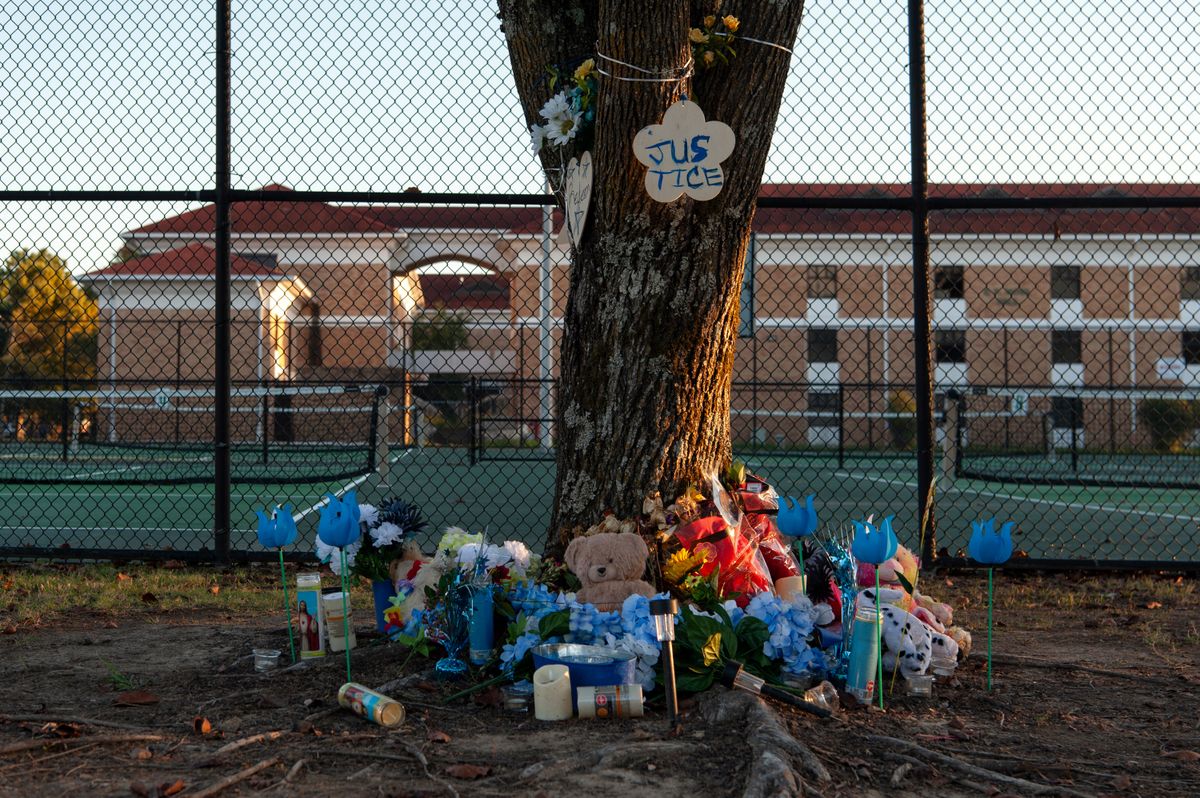Copyright The Marshall Project

“Southern trees bear strange fruit Blood on the leaves and blood at the root Black bodies swinging in the southern breeze Strange fruit hanging from the poplar trees” – from “Strange Fruit,” recorded in 1939 by jazz singer Billie Holiday In the heart of the Mississippi farmland, where cotton plantations once drove the slave economy, the recent news of a Black student found hanged from a tree on the campus of Delta State University evoked stark images of the state’s post-Civil War history of public lynchings. The Sept. 15 death of 21-year-old Demartravion “Trey” Reed has been ruled a suicide by local officials. But Reed’s mother, Sophia, and other family members dispute that finding. They, along with community members, claimed at a rally on campus Oct. 18 that Reed’s body showed signs of physical injuries that could not have been self-inflicted. The results of a second, independent autopsy requested by the family and paid for by an outside foundation have not been publicly released. “Trey Reed was lynched right here just over a month ago,” Krystal Muhammad, national chair of the New Black Panther Party, said at the rally. The NBPP is not connected with the Black Panther Party of the 1960s. “We’re here for justice for Trey Reed.” Since 2000, in addition to Reed, at least eight Black men have been found hanging from trees in Mississippi, according to a review of past news stories. All of the deaths were ruled suicides. Mississippi and the South’s deadly racism inspired the protest lyrics of “Strange Fruit,” which described a time when lynching — or the hanging of Black men, women and even children — was common in the South. During the post-slavery era known as “Jim Crow,” Black people were reminded constantly that they were “less than.” Less than White. Less than human. Reed’s death has become a stark reminder of those times — and a fear that those times never truly disappeared. Reed died the same week right-wing activist Charlie Kirk was assassinated while speaking at Utah Valley University, leading to some anonymous threats against historically Black colleges and universities across the nation. None were reported at Delta State, a school of about 2,600 students, where about 40% of the students are Black. On the same day as Reed’s death, a 35-year-old White man was found hanging from a tree about 100 miles south of the Delta State campus. His death was ruled a suicide, and there have been no calls for additional investigations. There is no known connection between the two hangings other than that both happened on the same day. For Black Mississippians, a tree hanging can trigger the stories of racial horrors passed down through generations. The shared history continues to shape how people of color perceive themselves and their safety. The violence of the post-Reconstruction era and the struggle for civil rights have led to skepticism of local institutions and authorities, chronicled over the decades by Mississippian and Black journalist Ida B. Wells, the NAACP and other organizations. There were at least 581 lynchings in Mississippi from 1882 through 1968, the most of any state, according to the NAACP. A lynching is a public killing done outside the justice system, usually by a mob that was often aided or ignored by authorities. Nearly all the victims were Black. Tree hangings were frequently used to send a message of terror to the Black community. “We know a lot more about triggering now, much more than when we used to,” said Michael Forster, emeritus professor of social work at the University of Southern Mississippi in Hattiesburg. “Even seemingly minor events can trigger someone who has either directly or indirectly experienced trauma.” Intergenerational trauma Willena Scott-White is a Black woman who grew up in the Mississippi Delta. Her father, Ed Scott, was a well-respected catfish farmer who opened the state’s first Black-owned catfish processing plant in Mississippi because White processors refused to do business with him because of his race. Reed’s death at Delta State in Cleveland, in the heart of the Mississippi River’s floodplain, brought back memories to 77-year-old Scott-White and others like her who grew up Black in the South. In her book, “Post Traumatic Slave Syndrome: America’s Legacy of Enduring Injury & Healing,” Black researcher Joy DeGruy wrote that the legacy of multigenerational trauma is often passed to new generations. Parents passing stories and behaviors onto their children are the key ways the trauma remains fresh, said DeGruy, who holds a doctorate in social work and is a past assistant professor at Portland State University School of Social Work. She now heads the nonprofit Be The Healing. Reed’s death sparked national news coverage and a slew of speculation on social media. A TikTok post that garnered more than 20,000 “likes” questioned the investigation's transparency. Ashleytheebarroness is a Black woman with nearly 700,000 followers and who describes herself as “History Exposed: Tenured Truth.” She said in a Sept. 19 post that “when a Black man is found hanging from a tree in Mississippi, I flinch because that is not just history, that is memory.” For 28-year-old Evin Smith, who grew up in Hattiesburg, in Mississippi’s Pine Belt, it’s hard to believe a young Black man would choose death by hanging. Smith said that although he loves his state, he is aware of its history — past and recent — of violent racism. He said the state’s Jim Crow history was often discussed by family members when he was growing up. “If I’m being honest, I know no Black person that’s gonna go and hang themselves,” he said. That’s why, to Scott-White, the hanging of a Black man, even if ruled a suicide, tells a different story from the Black perspective. “That he was found hanging in a tree on the university, how does that happen?” she asked. “I mean, how does a young man get that desperate, and you know, hurt, to want to do something like that?” Her sister, 79-year-old Rose Pegues, said that learning that a young Black man’s hanging death was ruled a suicide was difficult to accept when put in the light of the South’s Jim Crow history. Life Inside Essays by people in prison and others who have experience with the criminal justice system Her feelings draw on generations of families torn from their homes and loved ones, forced into slavery and bred like animals. This message was clear across the decades: “You degraded me. I was no longer human, and that’s what you told me.” In light of that history, “We don’t hang ourselves,” Pegues said. “We may shoot ourselves. We may take too many pills, but we are not going to hang ourselves. If this was part of our lives when we were slaves.” The Centers for Disease Control and Prevention lists suffocation, including hanging, as the second leading cause of self-harm for Black people. Death by a firearm is the leading method of suicide for Black and White people, the CDC reported in 2020. Second autopsy pending Scott-White also believes that using a tree is one of the last ways a young Black man would end his life. She has lost family members to suicide, “but I’m questionable about the hanging part, number one, and the other thing that troubles me is the ‘thorough investigation’” after three days, she said. “It isn’t thorough because you’ve got too many people you need to interview.” There was apparent confusion shortly after Reed’s body was first discovered. Rumors spread on social media that Reed had broken limbs and had been lynched. The county coroner said in a statement that he saw no broken limbs or “injuries consistent with an assault.” And the school’s police chief, Mike Peeler, said at a press conference that there was no evidence of foul play. He said there was a video of Reed, but did not specify what it showed. He said the video was turned over to the Cleveland Police, which is leading the investigation. The police chief did not respond to a request for comment, but the department said in a statement that all files and investigative materials have been turned over to the FBI and the U.S. Attorney’s Office for review. The media knew about Reed’s death before his family did, family lawyer Vanessa J. Jones said at a press conference the next day. By Oct. 6, new rumors suggesting Reed was murdered started spreading on TikTok and other platforms. Scott-White said with the rumors and inconsistent information, “That’s the part that’s troubling me. Is he getting justice? Is his family getting justice?” Former NFL quarterback Colin Kaepernick’s Know Your Rights Camp is funding a second, private autopsy for the Reed family. The family’s attorneys did not return calls seeking comment on the second autopsy results. Scott-White said she hopes the Reed family gets the closure they need.



